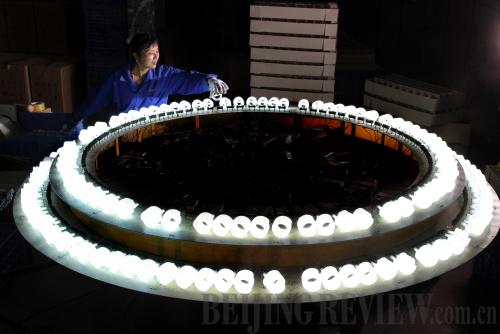|
 |
|
LOCAL ADVANTAGES: A worker checks tri-phosphor energy-saving bulbs made from rare earths at a factory in an industrial park in Jing'an County, east China's Jiangxi Province (XU ZHONGTING) |
According to a World Trade Organization (WTO) Appellate Body ruling published on August 7, China has lost its appeal against a case brought by the United States, the European Union and Japan challenging its restrictions on exports of rare earths.
"China has not demonstrated that the export quotas that China applies to various forms of rare earths, tungsten and molybdenum by virtue of the series of measures at issue are justified," the document's conclusion stated.
China's Ministry of Commerce (MOFCOM) said that it regretted the WTO's decision to uphold a previous ruling against China's management of rare earth exports.
In a statement, the MOFCOM announced that China will evaluate the ruling and adopt measures in accordance with WTO rules to protect fair competition and ensure sustainable development.
"We aren't surprised by the ruling, as the panel held that China's export restrictions on these materials were inconsistent with WTO rules, but we insist that the purpose is to protect the environment and exhaustible natural resources," said Li Chenggang, Director of the Department of Treaty and Law at the MOFCOM.
Things aren't any better inside the country. Although China has annual exploration and smelting quotas in place, illegal mining, black market dealing and smuggling of rare earth products that effectively bypass the export quota system remain problems endemic to the sector. They have disrupted the rare earth market and have led to a nosedive in the prices of the valuable minerals in China.
So then, what exactly should the country do to improve the fortunes of this rampantly expanding yet highly pollutant industry?
Beset by difficulties
Rare earths, a class of 17 metals, are valuable and non-renewable resources essential in green technologies such as wind turbines and electric car batteries as well as in military sectors. Therefore, they have been dubbed "vitamins to industries."
China is the world's largest producer and exporter of rare earth, accounting for 95 percent of the global output but possessing only 36 percent of global reserves, according to China's Ministry of Industry and Information Technology (MIIT).
Although rare earths are of vital significance to the development of clean technologies, exploration projects to locate for rare earths paradoxically cause severe environmental pollution.
To curtail pollution and preserve resources, the Chinese Government applied restrictive measures to the sector in 2010, including export quotas and export tariffs.
The move immediately triggered opposition from the European Union, the United States and Japan. In March 2012, the trio lodged a joint complaint to the WTO, accusing China of breaking WTO rules on rare earth exports. A panel was formed in September 2012 to look into the dispute, and a report on March 26 this year found that China's measures had violated WTO rules. The United States appealed on technical grounds on April 8 and China appealed on April 17.
In addition to global trade disputes, China's domestic rare earth industry is highly fragmented. Small-scale mining and cutthroat price competition over the years have led the sector into trouble.
| 